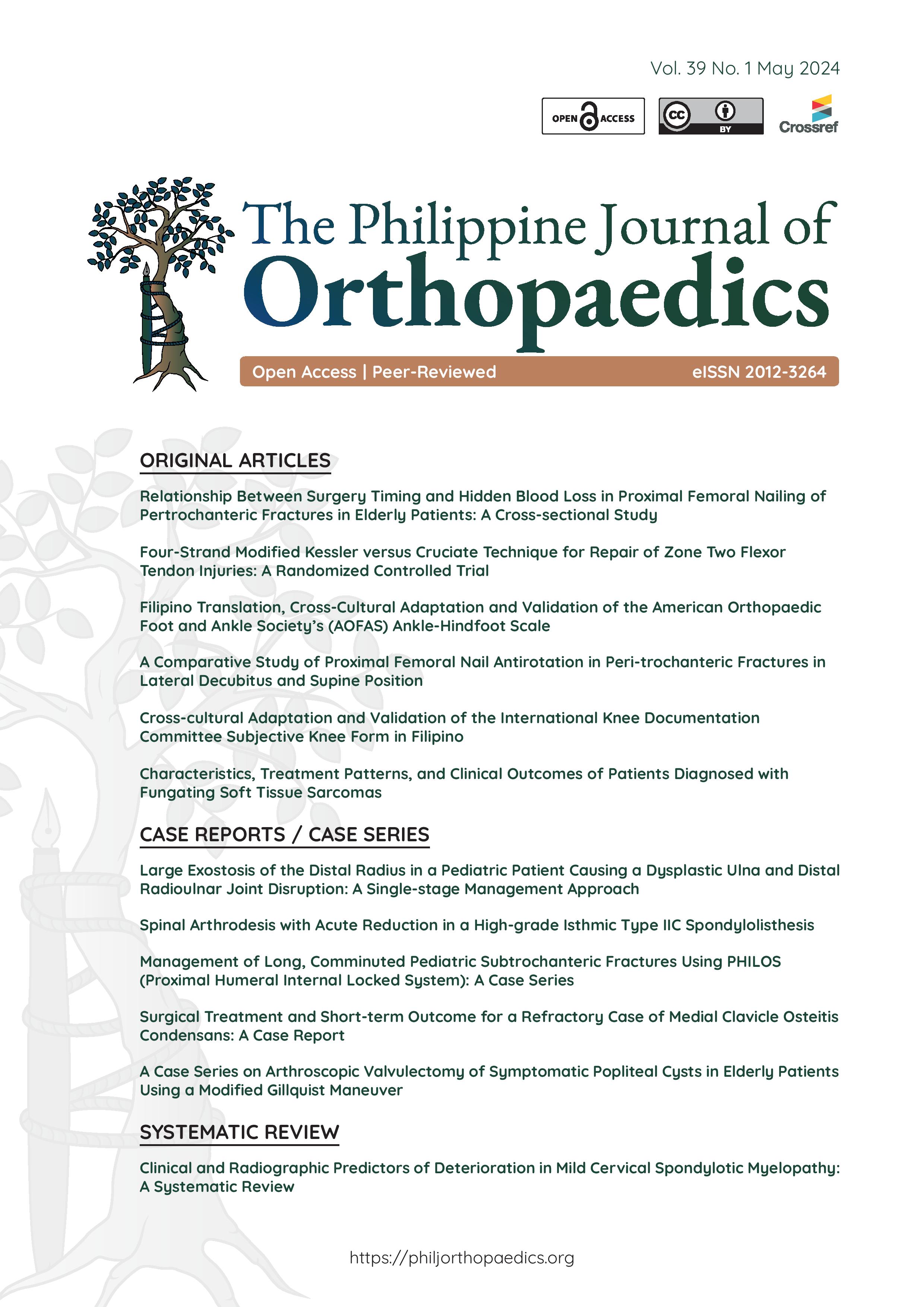Spinal Arthrodesis with Acute Reduction in a High-Grade Isthmic Type IIC Spondylolisthesis
Main Article Content
Abstract
The objective of this study was to present a case of Spondylolisthesis of the Isthmic Type (IIC), with Meyerding Grade III, high-grade dysplastic morphology, presenting with no neurologic deficits, which underwent spinal arthrodesis with acute reduction of L5-S1 segment. Spondylolisthesis itself is rare, presenting in 6% of the adult population with low back pain. Among these cases, 11.3% are characterized by high-grade spondylolisthesis, often accompanied by neurological deficits.
This study presents the case of a young adult woman (32 years old) with spondylolisthesis of the Isthmic Type (IIC – Acute Pars Fracture), Meyerding Grade III (slippage of >50%), presenting with no neurologic deficits. We present her outcomes after undergoing instrumented spinal arthrodesis with a reduction in terms of radiographic measurements, pain, presence of post-operative neurologic deficits, and return to work. Post-operatively, the lumbar lordosis angle improved from 84 degrees to 48 degrees. There was less pain, greater functional independence in terms of activities of daily living, and eventual return to work.
Even for high-grade spondylolisthesis, reduction of the affected level with instrumented fusion may provide excellent outcomes in terms of spinal alignment, pain, and return to work.
Article Details

This work is licensed under a Creative Commons Attribution 4.0 International License.

This work is licensed under a Creative Commons Attribution 4.0 International License.
References
Li N, Scofield J, Mangham P, Cooper J, Sherman W, Kaye A. Spondylolisthesis. Orthop Rev (Pavia). 2022;14(4):36917. https://pubmed.ncbi.nlm.nih.gov/35910544 https://www.ncbi.nlm.nih.gov/pmc/articles/PMC9329062. https://doi.org/10.52965/001c.36917.
Rivollier M, Marlier B, Kleiber JC, Eap C, Litre CF. Surgical treatment of high-https://pubmed.ncbi.nlm.nih.gov/32952331. https://www.ncbi.nlm.nih.gov/pmc/articles/PMC7486580. htps://doi.org/10.1016/j.jor.2020.08.015.
Kunze KN, Lilly DT, Khan JM, et al. High-grade spondylolisthesis in adults: current concepts in evaluation and management. Int J Spine Surg. 2020;14(3):327–40. https://pubmed.ncbi.nlm.nih.gov/32699755. https://www.ncbi.nlm.nih.gov/pmc/articles/PMC7343250 DOI: 10.14444/7044
García-Ramos CL, Valenzuela-González J, Baeza-Álvarez VB, Rosales-Olivarez LM, Alpizar-Aguirre A, Reyes-Sánchez A. Degenerative spondylolisthesis I: general principles. Acta Ortop Mex. 2020;34(5):324–8. https://pubmed.ncbi.nlm.nih.gov/33634638.
McGuire R Jr., MD. Adult isthmic spondylolisthesis. In: Rothman-Simeone. The Spine, 6th ed, chapter 72. Philadelphia, PA: Elsevier; 2011.
Burton MR, Dowling TJ, Mesfin FB. Isthmic spondylolisthesis. Treasure Island (FL): StatPearls Publishing; 2023. https://www.ncbi.nlm.nih.gov/books/NBK441846/.
Mohile NV, Kuczmarski AS, Lee D, Warburton C, Rakoczy K, Butler AJ. Spondylolysis and Isthmic Spondylolisthesis: A Guide to Diagnosis and Management. J Am Board Fam Med. 2022;35(6):1204–16. https://pubmed.ncbi.nlm.nih.gov/36526328.
Rivollier M, Marlier B, Kleiber J-C, Eap C, Litré CF. Surgical treatment of high-grade spondylolisthesis: technique and results. J Orthop. 2020;22:383-9. https://pubmed.ncbi.nlm.nih.gov/32952331. https://www.ncbi.nlm.nih.gov/pmc/articles/PMC7486580. https://doi.org/10.1016/j.jor.2020.08.015
Longo UG, Loppini M, Romeo G, Maffulli N, Denaro V. Evidence-based surgical management of spondylolisthesis: reduction or arthrodesis in Situ. J Bone Joint Surg Am. 2014;96(1):53–8. https://pubmed.ncbi.nlm.nih.gov/24382725. https://doi.org/10.2106/JBJS.L.01012
Gonçalves Barsotti CE, Aguiar Lira RC, Andrade RM, Torini AP, Ribeiro AP. L5 Radiculopathy After Formal Reduction of High-Grade SDSG Type 5 and 6 L5-S1 Isthmic Spondylolisthesis with 2-Year Follow-Up. Int J Spine Surg. 2021;15(4):645–53. https://pubmed.ncbi.nlm.nih.gov/34281952. https://www.ncbi.nlm.nih.gov/pmc/articles/PMC8375700.
Dimitrijević V, Šćepanović T, Milankov V, Milankov M, Drid P. Effects of corrective exercises on lumbar lordotic angle correction: a systematic review and meta-analysis. Int J Environ Res Public Health. 2022;19(8):4906. https://pubmed.ncbi.nlm.nih.gov/35457772. https://www.ncbi.nlm.nih.gov/pmc/articles/PMC9025799. https://doi.org/ 10.3390/ijerph19084906
Berry H. Textbook of Orthopaedic Medicine, vol 1: diagnosis of soft tissue lesions, 8th ed. J R Soc Med. 1983;76(6):535. https://www.ncbi.nlm.nih.gov/pmc/articles/PMC1439227
Hultman G, Saraste H, Ohlsen H. Anthropometry, spinal canal width, and flexibility of the spine and hamstring muscles in 45-55-year-old men with and without low back pain. J Spinal Disord. 1992;5(3):245–53. https://pubmed.ncbi.nlm.nih.gov/1387820. https://doi.org/10.1097/00002517-199209000-00001
Cailliet R. Low back pain syndrome. 5th ed. Philadelphia, PA: FA Davis Company; 1995.
Lin RM, Jou IM, Yu CY. Lumbar lordosis: normal adults. J Formos Med Assoc. 1992;91(3):329–33. https://pubmed.ncbi.nlm.nih.gov/1354697.
Berlemann U, Jeszenszky DJ, Bühler DW, Harms J. The role of lumbar lordosis, vertebral end-plate inclination, disc height, and facet orientation in degenerative spondylolisthesis. J Spinal Disord. 1999;12(1):68–73. https://pubmed.ncbi.nlm.nih.gov/10078953.
Neumann DA. Kinesiology of the musculoskeletal system: foundations for rehabilitation. Elsevier Health Sciences; Amsterdam, The Netherlands: Elsevier; 2016.
Lian XF, Hou TS, Xu JG, et al. Single segment of posterior lumbar interbody fusion for adult isthmic spondylolisthesis: reduction or fusion in situ. Eur Spine J. 2014;23(1):172–9.
He R, Tang GL, Chen K, Luo ZL, Shang X. Fusion in situ versus reduction for spondylolisthesis treatment: grading the evidence through a meta-analysis. Biosci Rep. 2020;40(6):BSR20192888. https://pubmed.ncbi.nlm.nih.gov/32510149. https://www.ncbi.nlm.nih.gov/pmc/articles/PMC7315725. https://doi.org/10.1042/BSR20192888





